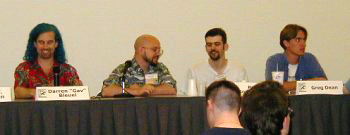July 25, 2001
Con report, Part Two...I guess I really should be linking the rest of my sketch-book contributors. *sigh*. Okay...
Here are links for Jeff Darlington, Brad Guigar, Matt Milligan, Tatsuya Ishida, John Troutman, Steve Troop, Scott Maddix, Albert Temple, and Darren "flesh-Gav" Bleuel as listed in my last letter. This was not a complete list. It omitted Scott Kurtz, Amber Greenlee, Shannon Wheeler, and Stephen Notley.
So what else was at the 'Con besides cool 'toonists who doodled in my sketchbook? Well, there were a couple of panels I went to, one of which I got to be a panelist for (I was standing in for Chris Crosby, who strained his back loading stuff up for the 'Con, and didn't recover in time to make it at all. My heart goes out to you man... If I were you, and knew what you'd missed, I'd be weeping right now.) I love panels. Most people come to a panel to be entertained while maybe learning something. Thus, the panelist is under a moral obligation to be clever, knowledgeable, and sometimes conflagratory. Think "History 101" meets "Jerry Springer" and you've got your format.
| Anyway, at the Keenspot Panel I got the opportunity to wax eloquent (quotes from me at the panel: "death threats do not equal five dollars" and "I've got two words for you, and one of them is 'schlock'") and to help my cohorts share the gospel of webcomics to the crowd. Not that the crowd needed convincing, mind you. It was just good practice. |  From left: Darren Bleuel (cartoonistof NUKEES and co-creator/co-CEOof Keenspot), Howard Tayler (cartoonist of SCHLOCKMERCENARY), Paul Southworth (cartoonistof Keenspot webcomic KRAZYLARRY and Keenspot print comic book BLACKPLAGUE, which debuted at the Con on Wednesday night),and Greg Dean (REALLIFE). |
The other panel was "The business of digital comics," and the panelists were mostly blowing smoke out their butts (with the notable exceptions of the Scotts, even Kurtz and McCloud) until me and another guy battering-rammed the moderator with this question: "What are your revenue streams? Help us count them, please." It was nice to see the panelists get all honest after that. Let's face it--digital media in general is not profitable yet, except as a means for selling merchandise or paper media. Once we got over that hurdle the panel was a lot of fun.
I learned some neat stuff, too. Comics in general are a recession-commodity. When the economy booms, everybody spends money on expensive entertainment. But when the economy tanks--I mean TRULY tanks--folks don't give up on entertainment altogether. They go buy a comic book. It's cheap, it's escapist, and that's good enough. In the latest economic boom, the comic industry has seen a 'slip' in size from around $250 million/year to $80 million/year (1993, and 2000, if my memory serves me correctly).
To put this in perspective, $250 million a year is enough to keep about 2,000 employees comfortably employed full-time, with some of them getting big, fat, executive salaries, and with money left over for things like operating expenses, facilities, etc. Considering the fact that there were over 6,000 pro-passes issued to the 'con, I'd say that the comic industry can't even begin to pretend to think about HOPING to pay a fraction of the people who'd like to work in it. And the ones who do work in it aren't getting rich.
And that's where you come in. You read web-comics, right? Well, tell a friend about them. Let's get more folks involved in this medium. I'm not telling you to go buy a comic-book, but this industry sure as shootin' needs a shot in the arm, and that means FRESH READERS. You go get some, okay?
Oh, just so you know, my buffer dropped to a mere 12 days on Monday, but the 'Con was so refreshing and so inspiring, that as of this writing I'm up to 19 days. Woo!


